Monday Feb 23, 2026
Monday Feb 23, 2026
Wednesday, 10 March 2021 00:30 - - {{hitsCtrl.values.hits}}
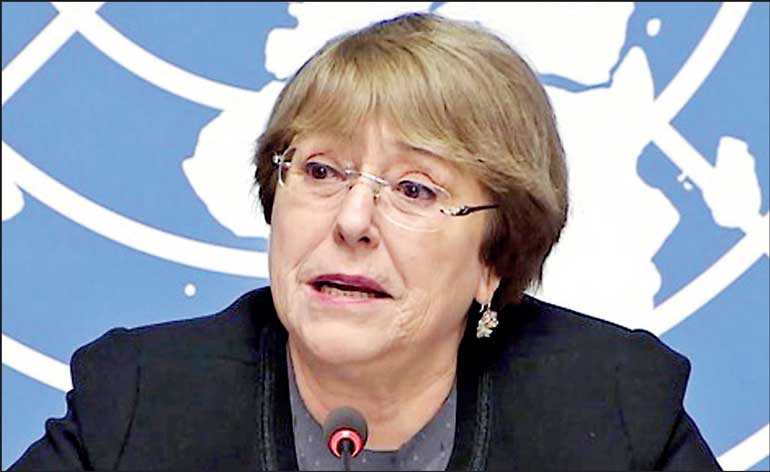
UN High Commissioner for Human Rights Michele Bachelet
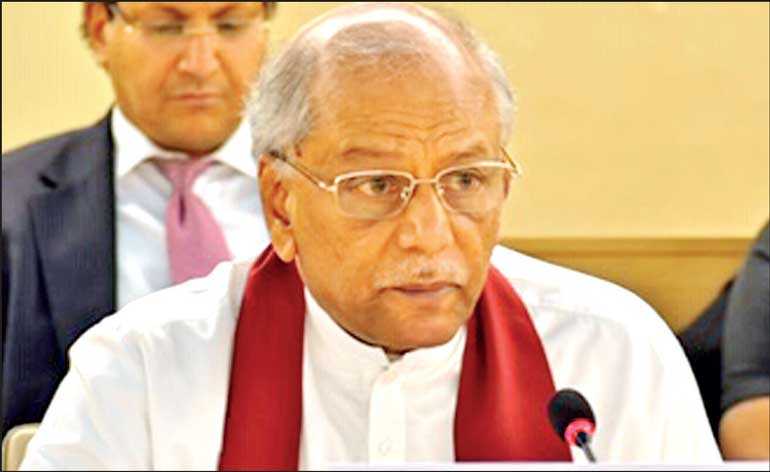
Foreign Relations Minister Dinesh Gunawardena
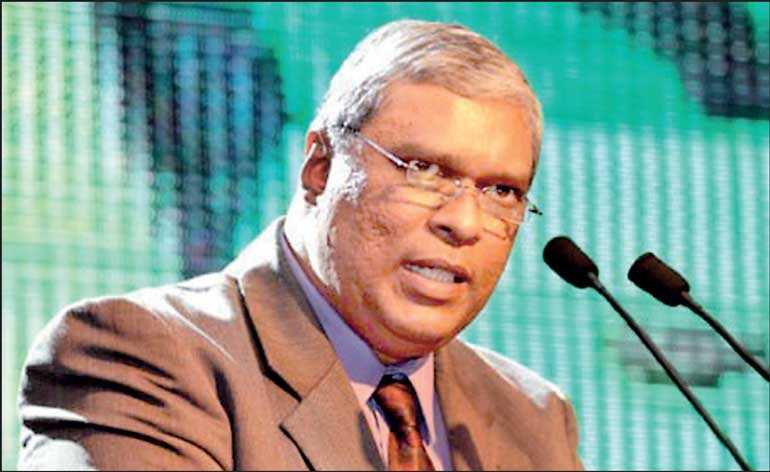
SL Ambassador to the UN in Geneva C.A. Chandraprema
 The ‘Great Game’ in Geneva involving Sri Lanka is now underway at the UNHRC! The 46th regular session of the United Nations Human Rights Council (UNHRC) that commenced on 22 February at the Palais des Nations in Geneva is scheduled to end after 30 days on 23 March.
The ‘Great Game’ in Geneva involving Sri Lanka is now underway at the UNHRC! The 46th regular session of the United Nations Human Rights Council (UNHRC) that commenced on 22 February at the Palais des Nations in Geneva is scheduled to end after 30 days on 23 March.
The current membership (2021) of the UNHRC is as follows: Argentina, Armenia, Austria, Bahamas, Bahrain, Bangladesh, (Plurinational State of) Bolivia, Brazil. Bulgaria, Burkina Faso, Cameroon, China, Côte d’Ivoire, Cuba, Czechia, Denmark, Eritrea, Fiji, France, Gabon, Germany, India, Indonesia, Italy, Japan, Libya, Malawi, Marshall Islands, Mauritania, Mexico, Namibia, Nepal, Netherlands, Pakistan, Philippines, Poland, Republic of Korea, Russian Federation, Senegal, Somalia, Sudan, Togo, Ukraine, United Kingdom of Great Britain and Northern Ireland, Uruguay, Uzbekistan and (Bolivarian Republic of) Venezuela.
In speaking of the great game at the UNHRC in Geneva, it would be pertinent to refer to a pithy observation made by Sri Lanka’s Foreign Relations Minister Dinesh Gunawardena in Geneva last year. Addressing the UNHRC its 43rd sessions in February 2020, Gunawardena said that Sri Lanka’s foreign policy had been reduced to a “zero-sum game” and that his country was a “pawn on the chess board of global politics”. The Foreign Relations Minister’s remarks in 2020 aptly describe the nature of the Geneva ‘Great Game’ being played in 2021.
The Foreign Minister was of course then critiquing the previous Sirisena-Wickremesinghe Government for co-sponsoring a resolution on Sri Lanka along with the USA and 10 other countries in 2015. It was depicted as a betrayal and sell-out by the Opposition consistently. President Gotabaya Rajapaksa was elected in 2019 on a mandate opposing that resolution.
Dinesh Gunawardena therefore announced in 2020, Sri Lanka’s decision to “withdraw from the co-sponsorship of Resolution 40/1 on ‘Promoting reconciliation, accountability and human rights in Sri Lanka,’ which also incorporates and builds on preceding Resolutions 30/1 of October 2 015 and 34/1 of March 2017.”
Twin challenges
It is the fall-out from this withdrawal – decried as unnecessary grandstanding by detractors of the Gotabaya Government – that is being experienced by Sri Lanka now. As far as Sri Lanka is concerned, the twin challenges faced by the Government of President Gotabaya in Geneva are the country specific report by the United Nations High Commissioner for Human Rights Michele Bachelet and the resolution pertaining to Lanka submitted by six countries for adoption through voting by the 47 member states of the UNHRC.
The UN Human Rights Chief had released her report to the public on 9 February, a fortnight before the UNHRC sessions began. It was titled ‘Promoting reconciliation, accountability and human rights in Sri Lanka – Report of the United Nations High Commissioner for Human Rights’. The hard-hitting report severely reprimanded the Sri Lankan Government and urged member states of the council to adopt stringent measures. Furthermore the Human Rights Commissioner’s office publicised the report through a media campaign.
A draft resolution on Sri Lanka too was submitted to the UNHRC. According to UNHRC spokesman Rolando Gomez the first draft resolution to be tabled at the UNHRC on the first day itself was on Sri Lanka. It was presented by the United Kingdom (UK) with the co-sponsorship of Canada, Germany, Malawi, Montenegro and North Macedonia. The six countries together are referred to as the core group on Sri Lanka. It would be taken up for voting on 22 or 23 March. However the current text is expected to undergo several changes before the final vote.
This is because the core group of countries who are strongly backed by the USA want to ensure the passage of the resolution on Sri Lanka by the UNHRC. Sri Lanka on the other hand is backed by China and to some extent Pakistan. According to informed diplomatic sources, a prima facie survey of the battle lines drawn revealed that the core group was sure of only 17 out of 47 member state support for the resolution currently. The anti-resolution camp was sure of 13 at present.
Based on these estimates it appears that the votes of 17 countries are up for grabs. In addition to striving to retain this support base, both sides would lobby intensively to win over some from the opposing camps. Also attempts would be made to coax or persuade member states into abstaining from voting when a pro-vote cannot be procured.
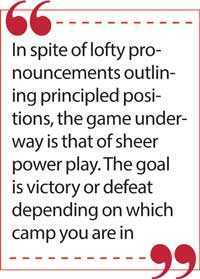 Power play
Power play
Against this backdrop the proponents of the resolution on Sri Lanka would make several compromises and tactical adjustments in the text and wording of the resolution draft with the strategic purpose of garnering support from member states as the 46th session continues.
Days before the 46th UNHRC session began, the core group distributed a document to friendly diplomatic missions, selected non-governmental organisations and ardent Human Rights activists. It was titled “zero draft” and contained the text of the proposed resolution on Sri Lanka comprising 15 perambulatory and 16 operational paragraphs.
However there were some changes to the text when it was tabled. Thereafter some more changes in the form of additional words and sentences and even new clauses have been incorporated into the text as the UNHRC began proceedings. More changes are likely until 16 March which is the final day for resolution drafts to be finalised. Even then a last minute change before voting on 22 or 23 March cannot be ruled out entirely.
All this is due to the nature of the game being played out in Geneva. In spite of lofty pronouncements outlining principled positions, the game underway is that of sheer power play. The goal is victory or defeat depending on which camp you are in.
The co-sponsoring proponents and their backers want the resolution on Sri Lanka to be successfully passed. Sri Lanka and her supportive countries want it to be defeated. Despite the moral posturing by either side and related arguments, the determining factor in the final analysis would be the extent of support each side can muster in the intra-UNHRC hustings. Thus the resolution draft is subject to continual tweaking by the co-sponsors.
Even as this goes on the other side namely Sri Lanka and her backers would not be idle either. They too would be lobbying intensely and canvassing support as is happening now. More importantly a key component of Sri Lanka’s counter strategy would be to change the prevailing facts on ground to facilitate matters in Geneva.
COVID cremations
An illustrative example of this was the “enforced” cremation of COVID-19 virus victims in Sri Lanka. This affected Muslim people in Sri Lanka drastically as tenets of the Islamic faith decreed burial of the dead. China and Sri Lanka were the only countries to implement a cremation only policy. All other countries adopted a cremation cum burial policy.
Eleven of the 47 or roughly one-fourth of UNHRC member states have an Islamic majority. Seeking to exploit this the core groups altered the draft resolution wording to include the “mandatory cremation” of Muslims issue. The objective was to woo Islam majority countries into voting for the resolution and wean them into refraining from opposing it. This stratagem seemed to have succeeded when the Organization of Islamic Cooperation (OIC) with 58 members issued a strong statement against Sri Lanka. Moreover Pakistan a longstanding friend of Sri Lanka also found it “difficult” to canvass for Sri Lanka in this situation. Pakistan Prime Minister Imran Khan made this known to the powers that be in Sri Lanka during his recent visit.
The Government that had remained rigid on the issue for so long ignoring the trauma and sorrow of Muslims in Sri Lanka became flexible overnight. It issued a fresh gazette enabling both burials and cremation of COVID victims subject to certain guidelines. There were some hiccups initially due to the insistence that burials would be allowed only in the islet of Iranaitheevu in the Gulf of Mannar.
Protests by the Muslim community as well as the Islet’s Tamil Catholic inhabitants along with “Geneva vibrations” made the Government relent. An alternative was found in Oddamaavadi in Batticaloa District and bodies of Muslim COVID victims are now being buried there according to religious rites.
Having altered ground realities on the cremation issue, Sri Lanka was on “terra firma” in revising its approach on the matter in Geneva. IOC criticism was neutralised while Pakistan found it easier to lobby for Sri Lanka at the UNHRC. So much so that Foreign Ministry circles in Colombo are gloating that the flexibility displayed by the Government on the compulsory cremation issue has increased its anticipated vote tally at the UNHRC to 15.
Lanka’s Ambassador to the UN in Geneva C.A. Chandraprema insisted during informal discussions in Geneva that the co-sponsors of the resolution remove the reference to mandatory cremations in the text because it was “obsolete” after the Government had reversed its policy. This was adhered to.
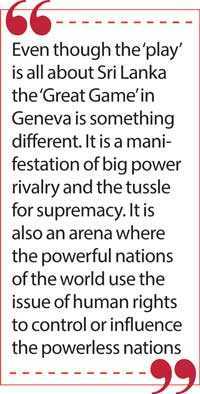 Tussle for supremacy
Tussle for supremacy
As stated earlier, Minister Dinesh Gunawardena’s reference to Sri Lanka being a “pawn on the chess board of global politics”
is most apt.
Even though the ‘play’ is all about Sri Lanka the ‘Great Game’ in Geneva is something different. It is a manifestation of big power rivalry and the tussle for supremacy. It is also an arena where the powerful nations of the world use the issue of human rights to control or influence the powerless nations. In that sense the playing field in Geneva is not level for small countries such as Sri Lanka.
Retired Indian diplomat M.K. Bhadrakumar who served in Sri Lanka as Political Secretary at the Colombo Indian High Commission in the early ’80s writes about this concisely in an article titled ‘US exceptionalism surges again. Will it fly?’ in the Indian Punchline. It is of particular reference to Sri Lanka in the current context.
This is what Bhadrakumar says: “The human rights toolkit is universally applicable and there is not a single country on earth, including the US, which doesn’t have a problem with democracy and human rights… Evidently, the toolkit becomes a potent weapon to stigmatise the US’ adversaries Russia and China; to pressure small countries that do not conform to US regional policies (such as Sri Lanka, Cuba or Venezuela); or to extract concessions from countries by blackmailing them (such as Saudi Arabia).”
US role in the UN
The US role in the UN transformed drastically when Donald Trump was the US President. The US pulled out of the UNHRC in 2018 complaining over the “discriminatory” treatment being allegedly meted out to Israel. The then US Ambassador to the UN, Nikki Haley called the UNHRC a “cesspool of political bias”.
Things have changed dramatically after Joe Biden was elected President. The US is back with a bang at the UN and will be seeking re-election to the UNHRC soon for the 2022-2024 term. Commenting about the USA’s re-entry, Bhadrakumar says: “The US’ return to the UNHRC does not stem from noble intentions. It is primarily due to the worry over China’s increasing influence in the UN body during the US’ absence in the most recent years.”
Obviously the US has a different self-perception of its position. US Secretary of State Antony Blinken addressed the 46th session of the UN Human Rights Council via video conference on 24 February. Blinken said the US was “placing democracy and human rights at the centre” of its foreign policy.
“I’m here to reaffirm America’s commitment to respect and defend the human rights of all people, everywhere,” Blinken said in a speech that took a hard-line against authoritarianism and impunity for human rights abuses. “There is no moral equivalence between the actions of the United States, which are subject to robust, impartial, and transparent accountability mechanisms – and those of authoritarian regimes, which violate and abuse human rights with impunity,” he continued.
Blinken further said that those who hide under the mantle of promoting economic development while seeking to undermine human rights will be held to account, including for their own human rights violations. “We encourage the Council to support resolutions at this session addressing issues of concern around the world, including ongoing human rights violations in Syria and North Korea, the lack of accountability for past atrocities in Sri Lanka, and the need for further investigation into the situation in South Sudan,” the US Secretary of State said.
The return of the US to the UNHRC and its overt backing of the resolution on Sri Lanka has boosted its chances of success, opined a Western diplomat. Apparently the US, along with the UK, Canada and the EU, are jointly and separately lobbying on behalf of the resolution. According to the diplomat the target is 24 to 32 out of 47 votes. However the tactic of requesting member states to abstain from voting is also being pursued.
Sri Lanka is trying to counter this by its own canvassing. It is backed by China, Pakistan and Russia. It is surmised that China can exercise influence over eight to 13 member states. It is in this context that the ‘Great Game’ continues in Geneva.
Sri Lanka in the spotlight
The UNHRC’s main session was inaugurated on 22 February under the presidency of Ambassador Nazhat Shameem Khan of Fiji. From 22 to 24 February, representatives of 130 countries addressed the council in what is known as the High Level Segment.
Sri Lankan Foreign Relations Minister Dinesh Gunawardena addressing the council during the High Level Segment called upon member states to defeat the vote on the envisaged resolution on Sri Lanka. He also criticised the UN Human Rights High Commissioner’s report.
The UN Human Rights Chief’s report or Office of the High Commissioner for Human Rights (OHCHR) on Sri Lanka was presented as item 20 on the agenda. The report called on member states of the UN to pursue justice against Sri Lankan perpetrators of human rights violations by using universal or extra-territorial jurisdiction to provide redress to victims of abuses during Sri Lanka’s brutal civil war.
In her remarks to the council Michele Bachelet stated that her office would support judicial measures in outside jurisdictions because the Sri Lankan Government had “closed the door” to justice for grave rights abuses nationally.
“By repeatedly failing to advance accountability for past human rights violations committed, and by withdrawing its support for the Council’s resolution 30/1 and related measures, the Government has largely closed the door on the possibility of genuine progress to end impunity through a national process,” the UN Rights Chief told the 47-member Council.
The High Commissioner reiterated her call that there were clear warning signs that past patterns of violations could recur in Sri Lanka. “The Government of Sri Lanka had obstructed investigations and judicial proceedings into emblematic human rights cases,” she asserted.
Sri Lanka’s stance
When the interactive dialogue on the report on Sri Lanka took place Lankan Foreign Relations Minister Dinesh Gunawardena reiterated Sri Lanka’s stance on Bachelet’s report: “Sri Lanka rejects the High Commissioner’s Report which has unjustifiably broadened its scope and mandate further, incorporating many issues of governance and matters that are essentially domestic for any self-respecting, sovereign country,” observed Minister Gunawardena.
Continuing, the Minister stated: “Sri Lanka calls upon the members of this Council that any resolution which is based on this Report, be rejected by the Council and be brought to a closure.”
There was intense lobbying for support among member states by the core group of countries who tabled the resolution on Sri Lanka as well as Sri Lanka and friendly nations acting on her behalf. The interactive dialogue in the wake of the UN Human Rights Chief’s report provided an opportunity to make a preliminary assessment.
Forty countries had wanted to address the interactive dialogue session on Sri Lanka. Due to time constraints only 35 were able to do so; 20 of these countries spoke in support of Sri Lanka while 15 were critical. Among those supportive of Sri Lanka only 10 countries were voting members of the UNHRC while 14 of the 15 critical states were voting members.
A global South vs North divide seemed visible as most of those criticising Sri Lanka’s position were Western nations like the UK, Germany, Denmark, Canada and Norway. Among those supportive of Sri Lanka were countries like Eritrea, Pakistan. Philippines, Gabon and Nepal in addition to “old faithfuls” like Russia, Cuba and China. Conspicuous by their seemingly non-aligned stance were India, Japan and Australia.
The interactive dialogue was followed by two rounds of informal discussions in the first week of March. The draft resolution too was altered frequently. Another round or two of informal discussions are on the cards this week until the resolution text is finalised on 16 March. Thereafter the vote on the resolution would be taken up on 22 March. If there is a delay the vote would be on 23 March. There will be many twists and turns before the vote.
Meanwhile, there are many matters that need to be delved into in detail like the perceived lack of robustness in the resolution, the potential impact on Sri Lanka if passed by the UNHRC, the USA-China power tussle, the cryptic position of India, the ambiguous stance of Japan and Australia, the pivotal role played by Michele Bachelet, the perceptions of aggrieved entities concerning the UNHRC and the functional style of Sri Lanka’s Foreign Secretary and Ambassadors to the UN in New York and Geneva. These will be discussed in forthcoming articles.
(D.B.S. Jeyaraj can be reached at [email protected])